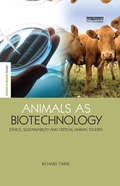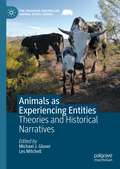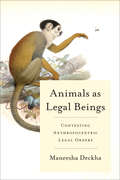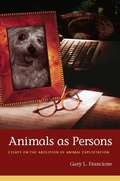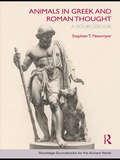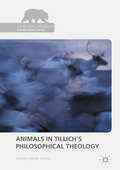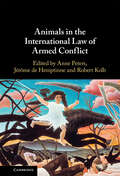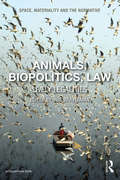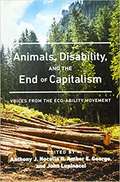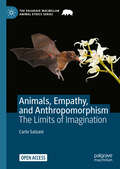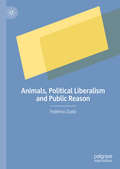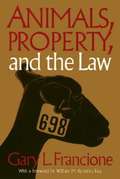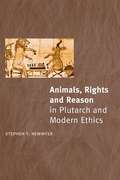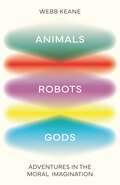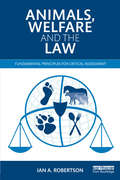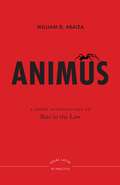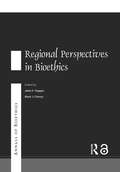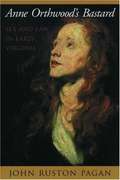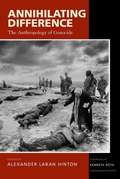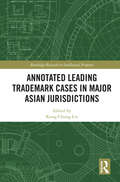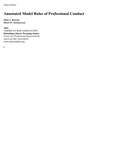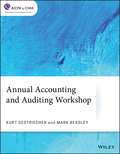- Table View
- List View
Animals as Biotechnology: "Ethics, Sustainability and Critical Animal Studies" (The\earthscan Science In Society Ser.)
by Richard TwineIn Animals as Biotechnology sociologist Richard Twine places the question of human/animal relations at the heart of sustainability and climate change debates. The book is shaped by the emergence of two contradictory trends within our approach to nonhuman animals: the biotechnological turn in animal sciences, which aims to increase the efficiency and profitability of meat and dairy production; and the emerging field of critical animal studies - mostly in the humanities and social sciences - which works to question the nature of our relations with other animals. The first part of the book focuses on ethics, examining critically the dominant paradigms of bioethics and power relations between human and non-human. The second part considers animal biotechnology and political economy, examining commercialisation and regulation. The final part of the book centres on discussions of sustainability, limits and an examination of the prospects for animal ethics if biotechnology becomes part of the dominant agricultural paradigm. Twine concludes by considering whether growing calls to reduce our consumption of meat/dairy products in the face of climate change threats are in fact complicit with an anthropocentric understanding of sustainability and that what is needed is a more fundamental ethical and political questioning of relations and distinctions between humans, animals and nature.
Animals as Experiencing Entities: Theories and Historical Narratives (The Palgrave Macmillan Animal Ethics Series)
by Les Mitchell Michael J. GloverThis volume explores the experiences of those with little or no power—usually, although not exclusively, animals. The theme of animals as experiencing entities is what links the chapters and characterises the volume. Broadly each author in this volume contributes in one of two ways. The first group, in Section 1, theoretically engages animal subjectivity, animal experiences, and ways in which these are to some extent accessible and knowable to humans. The second group of authors, in Section 2, offer narrative accounts about specific animals or groups of animals and explore to some extent their subjective historical experiences. In summary, the first section diversely theorises about animal experiences, while the second section’s authors assume animals’ subjective experiences and construct narratives that take into account how animals might have subjectively experienced historical phenomena.
Animals as Legal Beings: Contesting Anthropocentric Legal Orders
by Maneesha DeckhaIn Animals as Legal Beings, Maneesha Deckha critically examines how Canadian law and, by extension, other legal orders around the world, participate in the social construction of the human-animal divide and the abject rendering of animals as property. Through a rigorous but cogent analysis, Deckha calls for replacing the exploitative property classification for animals with a new transformative legal status or subjectivity called "beingness." In developing a new legal subjectivity for animals, one oriented toward respecting animals for who they are rather than their proximity to idealized versions of humanness, Animals as Legal Beings seeks to bring critical animal theorizations and animal law closer together. Throughout, Deckha draws upon the feminist animal care tradition, as well as feminist theories of embodiment and relationality, postcolonial theory, and critical animal studies. Her argument is critical of the liberal legal view of animals and directed at a legal subjectivity for animals attentive to their embodied vulnerability, and desirous of an animal-friendly cultural shift in the core foundations of anthropocentric legal systems. Theoretically informed yet accessibly presented, Animals as Legal Beings makes a significant contribution to an array of interdisciplinary debates and is an innovative and astute argument for a meaningful more-than-human turn in law and policy.
Animals as Persons: Essays on the Abolition of Animal Exploitation (Critical Perspectives On Animals Ser.)
by Gary FrancioneA prominent and respected philosopher of animal rights law and ethical theory, Gary L. Francione is known for his criticism of animal welfare laws and regulations, his abolitionist theory of animal rights, and his promotion of veganism and nonviolence as the baseline principles of the abolitionist movement. <P><P> In this collection, Francione advances the most radical theory of animal rights to date. Unlike Peter Singer, Francione maintains that we cannot morally justify using animals under any circumstances, and unlike Tom Regan, Francione's theory applies to all sentient beings, not only to those who have more sophisticated cognitive abilities.
Animals in China: Law And Society (The Palgrave Macmillan Animal Ethics Series)
by Deborah CaoJust as China is called the world factory for manufactured goods, it is also a world factory for manufactured animal cruelty in a new phenomenon of globalized animal cruelty. Animals in China examines animal protection in China in its legal, social and cultural contexts.
Animals in Greek and Roman Thought: A Sourcebook (Routledge Sourcebooks for the Ancient World)
by Stephen T. NewmyerAlthough reasoned discourse on human-animal relations is often considered a late twentieth-century phenomenon, ethical debate over animals and how humans should treat them can be traced back to the philosophers and literati of the classical world. From Stoic assertions that humans owe nothing to animals that are intellectually foreign to them, to Plutarch's impassioned arguments for animals as sentient and rational beings, it is clear that modern debate owes much to Greco-Roman thought. Animals in Greek and Roman Thought brings together new translations of classical passages which contributed to ancient debate on the nature of animals and their relationship to human beings. The selections chosen come primarily from philosophical and natural historical works, as well as religious, poetic and biographical works. The questions discussed include: Do animals differ from humans intellectually? Were animals created for the use of humankind? Should animals be used for food, sport, or sacrifice? Can animals be our friends? The selections are arranged thematically and, within themes, chronologically. A commentary precedes each excerpt, transliterations of Greek and Latin technical terms are provided, and each entry includes bibliographic suggestions for further reading.
Animals in Our Midst: The Challenges of Co-existing with Animals in the Anthropocene (The International Library of Environmental, Agricultural and Food Ethics #33)
by Bernice Bovenkerk Jozef KeulartzThis Open Access book brings together authoritative voices in animal and environmental ethics, who address the many different facets of changing human-animal relationships in the Anthropocene. As we are living in complex times, the issue of how to establish meaningful relationships with other animals under Anthropocene conditions needs to be approached from a multitude of angles. This book offers the reader insight into the different discussions that exist around the topics of how we should understand animal agency, how we could take animal agency seriously in farms, urban areas and the wild, and what technologies are appropriate and morally desirable to use regarding animals. This book is of interest to both animal studies scholars and environmental ethics scholars, as well as to practitioners working with animals, such as wildlife managers, zookeepers, and conservation biologists.
Animals in Tillich's Philosophical Theology (The Palgrave Macmillan Animal Ethics Series)
by Abbey-Anne SmithThis book explores how Paul Tillich’s systematic theology, focusing on the concepts of being and reason can benefit nonhuman animals, while also analysing how taking proper account of nonhuman animals can prove immensely beneficial. The author first explains the body of Tillich’s system, examining reason and revelation, life and the spirit, and history and the kingdom of God. The second section undertakes a critical analysis of Tillichian concepts and their adequacy in relation to nonhuman animals, addressing topics such as Tillich’s concept of ‘technical reason’ and the multidimensional unity of life. The author concludes by discussing the positive concepts in Tillich’s systematic theology with respect to nonhuman animals and creation, including the concept of universal salvation and Tillich’s interpretation of nonhuman animals and the Fall in Genesis.
Animals in the International Law of Armed Conflict
by Anne Peters Robert Kolb Jérôme De HemptinneAnimals are the unknown victims of armed conflicts. Wildlife populations usually decline during warfare, with disastrous repercussions on the food chain, on fragile ecosystems and precarious habitats. Belligerents take advantage of the chaos of war for poaching and trafficking of animal products. Livestock, companion, and zoo animals, highly dependent on human care, are direct victims of hostilities. The book is the first legal analysis of these issues. It maps the framework of international humanitarian law, examining which and how the concepts, principles, and rationales can be applied and adapted for a better protection of animals. The contributions inter alia discuss precautions for animal civilians, problems of animal combatants and prisoners, a specific status for veterinarian personnel, the recognition of biodiversity hotspots as specially protected zones, and the potential of enforcement mechanisms. The concluding chapter draws together novel interpretations and reform proposals.
Animals in the Sociologies of Westermarck and Durkheim (The Palgrave Macmillan Animal Ethics Series)
by Salla TuomivaaraThis book explores why animals, at some point, disappeared from the realm and scope of sociology. The role of sociology in the construction of a science of the ‘human’ has been substantial, building representations of the human sphere of life as unique. Within the sociological tradition however, animals have often been invisible, even non-existent. Through in-depth comparisons of the texts of prominent early sociologists Emile Durkheim and Edward Westermarck, Tuomivaara shows that despite this exclusion, representations of animals and human-animal relations were far more varied in early works than in the later sociological cannon. Addressing a significant gap in the interdisciplinary field of animal studies, Tuomivaara presents a close reading of the historical treatment of animals in the works of Durkheim and Westermarck to determine how the human-animal boundary was established in sociological theory. The diverse forms in which animals and ‘the animal’ appear in the works of early classical sociology are charted and explored, alongside the sociological themes that bring animals into these texts. Situated in contemporary theory, from critical animal studies to posthumanism, this important book lays the groundwork for a disciplinary shift away from this sharp human-animal dualism.
Animals, Biopolitics, Law: Lively Legalities
by Irus BravermanTypically, the legal investigation of nonhuman life, and of animal life in particular, is conducted through the discourse of animal rights. Within this discourse, legal rights are extended to certain nonhuman animals through the same liberal framework that has afforded human rights before it. Animals, Biopolitics, Law envisions the possibility of lively legalities that move beyond the humanist perspective. Drawing on an array of expertise—from law, geography, and anthropology, through animal studies and posthumanism, to science and technology studies—this interdisciplinary collection asks what, in legal terms, it means to be human and nonhuman, what it means to govern and to be governed, and what are the ethical and political concerns that emerge in the project of governing not only human but also more-than-human life.
Animals, Disability, and the End of Capitalism: Voices from the Eco-Ability Movement (Radical Animal Studies and Total Liberation #1)
by John Lupinacci Anthony J. Nocella Amber E. George<p>Animals, Disability, and the End of Capitalism is a collection of essays from the leaders in the field of eco-ability. The book is rooted in critical pedagogy, inclusive education, and environmental education. The efforts of diverse disability activists work to weave together the complex diversity and vastly overlooked interconnections among nature, ability, and animals. Eco-ability challenges social constructions, binaries, domination, and normalcy. Contributors challenge the concepts of disability, animal, and nature in relation to human and man. Eco-ability stresses the interdependent relationship among everything and how the effect of one action such as the extinction of a species in Africa can affect the ecosystem in Northern California. Animals, Disability, and the End of Capitalism is timely and offers important critical insight from within the growing movement and the current academic climate for such scholarship. The book also provides insights and examples of radical experiences, pedagogical projects, and perspectives shaped by critical animal studies, critical environmental studies, and critical disability studies. <p>Contributors include Sarah R. Adams, Marissa Anderson, Judy K. C. Bentley, Mary Fantaske, Amber E. George, Ava HaberkornHalm, John Lupinacci, Hannah Monroe, Anthony J. Nocella II, Nicole R. Pallotta, Meneka Repka, and Daniel Salomon.</p>
Animals, Empathy, and Anthropomorphism: The Limits of Imagination (The Palgrave Macmillan Animal Ethics Series)
by Carlo SalzaniThis open access book explores the role of imagination in animal ethics and its constitutive links to empathy/sympathy and anthropomorphism. The book argues for the constitutive role of imagination in ethical deliberation, but acknowledges that there exist important limits to its use. However, &“limit&” is here understood not merely negatively as restriction and insufficiency, but rather positively as &“condition of possibility,&” so what the book explores and analyses are the conditions for a positive and fruitful use of the imagination in ethics. The book uses as a &“frame&” the questions and issues raised in J.M. Coetzee&’s The Lives of Animals to explore some central and salient themes.
Animals, Political Liberalism and Public Reason
by Federico ZuoloThis book explores the problem of disagreement concerning the treatment of animals in a liberal society. Current laws include an unprecedented concern for animal welfare, yet disagreement remains pervasive. This issue has so far been neglected both in political philosophy and animal ethics. Although starting from disagreement has been the hallmark of many politically liberal theories, none have been devoted to the treatment of animals, and conversely, most theories in animal ethics do not take the disagreement on this issue seriously. Bridging this divide with a change of perspective, Zuolo argues that we should begin from the disagreement on the moral status of animals and the treatment we owe them. Reconstructing the epistemic nature of disagreement about animals, Zuolo proposes a novel form of public justification to find principles acceptable to all. By setting out a unified framework which honours the liberal principles of respect for diversity, a robust liberal political theory capable of dealing with diverse forms of disagreement, and even some forms of radical dissent, is achieved.
Animals, Property, and the Law
by Gary L. Francione"Pain is pain, irrespective of the race, sex, or species of the victim," states William Kunstler in his foreword. This moral concern for the suffering of animals and their legal status is the basis for Gary L. Francione's profound book, which asks, Why has the law failed to protect animals from exploitation? Francione argues that the current legal standard of animal welfare does not and cannot establish fights for animals. As long as they are viewed as property, animals will be subject to suffering for the social and economic benefit of human beings. Exploring every facet of this heated issue, Francione discusses the history of the treatment of animals, anti-cruelty statutes, vivisection, the Federal Animal Welfare Act, and specific cases such as the controversial injury of anaesthetized baboons at the University of Pennsylvania. He thoroughly documents the paradoxical gap between our professed concern with humane treatment of animals and the overriding practice of abuse permitted by U. S. law. Author note: Gary L. Francione is Professor of Law and Nicholas de B. Katzenbach Scholar of Law at Rutgers University Law School, Newark. He is also Co-director of the Rutgers Animal Rights Law Center.
Animals, Rights and Reason in Plutarch and Modern Ethics
by Stephen T. NewmyerThis groundbreaking volume explores Plutarch's unique survival in the argument that animals are rational and sentient, and that we, as humans, must take notice of their interests. Exploring Plutarch's three animal-related treatises, as well as passages from his ethical treatises, Stephen Newmyer examines arguments that, strikingly, foreshadow those found in the works of such prominent animal rights philosophers as Peter Singer and Tom Regan. Unique in viewing Plutarch’s opinions not only in the context of ancient philosophical and ethical through, but also in its place in the history of animal rights speculation, Animals Rights and Reasons points out how remarkably Plutarch differs from such anti-animal thinkers as the Stoics. Classicists, philosophers, animal-welfare students and interested readers will all find this book an invaluable and informative addition to their reading.
Animals, Robots, Gods: Adventures in the Moral Imagination
by Webb KeaneA mind-expanding exploration of the ethical bonds we share with the nonhumanMoral relationships saturate the living world, and the line between the human and nonhuman is blurrier than we might think. Animals, Robots, Gods provides a bold new vision of ethics defined less by the individual mind or society and more by our interactions with those around us, whether they are the pets we keep, the gods we believe in, or the machines we endow with life.Drawing on pioneering fieldwork around the globe by some of today&’s leading researchers, acclaimed anthropologist Webb Keane invites us to expand our moral imagination. We learn about the ethical dilemmas of South Asian animal rights activists, Balinese cockfighters, cowboys, and Japanese robot fanciers. We meet a hunter in the Yukon who explains to a bear why it must come out of hibernation and generously give itself up to him, a cancer sufferer in Thailand who sees his tumor as a reincarnated ox, and a computer that persuades users to confess their anxieties as if they were patients on a psychiatrist&’s couch. Through these and other stories, Keane challenges us to rethink our most basic ideas about who—and what—we deem worthy of moral consideration.Brimming with charm, wit, and insight, Animals, Robots, Gods reveals how centuries of conversations between us and nonhumans inform our conceptions of morality and will continue to guide us in the age of AI and beyond.
Animals, Welfare and the Law: Fundamental Principles for Critical Assessment
by Ian A. RobertsonIn this objective, practical and authoritative introductory text the author reveals how the fundamental principles of the human-animal relationship drive the development of animal law. The book explains the criteria by which the lawful use of animals is determined, and how these criteria impact evolving standards of animal protection and define the responsibilities of people in their interactions with animals. The author identifies 29 key principles which constitute the core knowledge necessary for people involved in debating, assessing, and guiding the evolution of society’s national and international rulebook of animal welfare law. The book also considers animal welfare and law in the context of a global market through discussion of common issues such as climate change, biosecurity, food safety and food supply. Based on successful law courses run by the author and his own expertise as an animal law lecturer, prosecutor and specialist legal adviser, the book combines insights from science, ethics and law to provide an essential understanding of what informs society and the law with regards to animals and their welfare.
Animus: A Short Introduction to Bias in the Law
by William D. AraizaAn introduction to the legal concept of unconstitutional bias.If a town council denies a zoning permit for a group home for intellectually disabled persons because residents don’t want “those kinds of people” in the neighborhood, the town’s decision is motivated by the public’s dislike of a particular group. Constitutional law calls this rationale “animus.”Over the last two decades, the Supreme Court has increasingly turned to the concept of animus to explain why some instances of discrimination are unconstitutional. However, the Court’s condemnation of animus fails to address some serious questions. How can animus on the part of people and institutions be uncovered? Does mere opposition to a particular group’s equality claims constitute animus? Does the concept of animus have roots in the Constitution?Animus engages these important questions, offering an original and provocative introduction to this type of unconstitutional bias. William Araiza analyzes some of the modern Supreme Court’s most important discrimination cases through the lens of animus, tracing the concept from nineteenth century legal doctrine to today’s landmark cases, including Obergefell vs. Hodges and United States v. Windsor, both related to the legal rights of same-sex couples. Animus humanizes what might otherwise be an abstract legal question, illustrating what constitutes animus, and why the prohibition against it matters more today than ever in our pluralistic society.
Annals of Bioethics: Regional Perspectives In Bioethics (Routledge Annals of Bioethics)
by Mark J. Cherry John F. PeppinRegional Perspectives in Bioethics" illustrates the ways in which the national and international political landscape encompasses persons from diverse and often fragmented moral communities with widely varying moral intuitions, premises, evaluations and commitments.
Anne Orthwood's Bastard: Sex and Law in Early Virginia
by John Ruston PaganPagan explores four cases of illegitimate pregnancy in colonial Virginia.
Annihilating Difference: The Anthropology of Genocide
by Alexander Laban HintonThis collection of original essays on genocide explores a wide range of cases, including Nazi Germany, Cambodia, Guatemala, Rwanda, and Bosnia.
Annotated Leading Trademark Cases in Major Asian Jurisdictions (Routledge Research in Intellectual Property)
by Kung-Chung LiuThere has been little or no study on trademark laws in Asia on a cross-jurisdictional level. This book aims at filling the existing gap and provides a comprehensive overview of trademark laws of eight major Asian jurisdictions and their most-updated trademark case law. The book analyses six of the principal issues that best reflect Asian features in trademark law and trademark development. The cases in the book are principally the most authoritative decisions, usually the first to deal with certain new emerging issues, or the first to apply particular statutory provisions in the respective jurisdiction. Also included are a small number of direction-changing, outlying or even controversial decisions. Each case report is divided into six sections: summary, legal context, facts, reasoning of the court, legal analysis, and commercial or industrial significance. Readers will find this book useful in both its overview of the legal context and how those cases are to be interpreted legally and commercially.
Annotated Model Rules of Professional Conduct
by American Bar Association Ellen J. Bennett Helen W. Gunnarsson Center for Professional Responsibility (American Bar Association) Staff House of Delegates StaffAn essential resource on lawyer ethics, revised and updated: The Annotated Model Rules of Professional Conduct is the ABA's definitive single-volume resource for information about how courts, disciplinary bodies, and ethics committees apply the lawyer ethics rules. <p><p>The Ninth Edition incorporates all of the amendments the ABA has made to the Model Rules of Professional Conduct through February 2019—including the 2018 amendments to the advertising rules and new Model Rule 8.4(g), prohibiting discrimination and harassment in conduct related to the practice of law. <p><p>Comprehensive and authoritative: Each chapter begins with the rule and its comment, a link to charts comparing each state's rule with the Model Rule, and then presents a detailed discussion of how the rule has been applied. The book gives citations to thousands of court cases, ethics opinions, law review articles, and internet resources, as well as treatises, the Restatement (3rd) of the Law Governing Lawyers, and the legislative history of the Model Rules.
Annual Accounting and Auditing Workshop (AICPA)
by Kurt Oestriecher Mark BeasleyAre your accounting and auditing skills up-to-date and on-par with industry standards? This guide provides updates on the latest standards, including accounting, auditing, compilation, preparation, and review. It covers important industry changes such as revenue recognition, leases, financial instruments, and SASs, and includes practical applications for each, to help you understand and apply the standards to real-life scenarios. Key topics covered include: Accounting, auditing, and attestation standards updates FASB projects and exposure drafts Private company financial reporting Revenue Recognition Leases, Financial Instruments, Peer Review, Trust Services, Cyber Security, SSAEs Going Concern; Private company financial reporting
